skills acTion Plan for The food and Beverage secTor - Department of ...
skills acTion Plan for The food and Beverage secTor - Department of ...
skills acTion Plan for The food and Beverage secTor - Department of ...
You also want an ePaper? Increase the reach of your titles
YUMPU automatically turns print PDFs into web optimized ePapers that Google loves.
• An aging population in most <strong>food</strong> <strong>and</strong> beverage sub<br />
sectors with approximately 45% <strong>of</strong> those in farming<br />
<strong>and</strong> fruit <strong>and</strong> crop growing aged 45 years or older in<br />
2001. This compares with 35% <strong>of</strong> the total work<strong>for</strong>ce.<br />
• Food <strong>and</strong> beverage consumers are now better<br />
educated about the benefits <strong>of</strong> healthy <strong>food</strong>, impacting<br />
on the types <strong>of</strong> <strong>skills</strong> needed in the <strong>food</strong> <strong>and</strong> beverage<br />
work<strong>for</strong>ce.<br />
• Employment locations in the <strong>food</strong> <strong>and</strong> beverage sector<br />
in 2003 are more evenly dispersed relative to the<br />
manufacturing industry <strong>and</strong> the economy. <strong>The</strong> <strong>food</strong> <strong>and</strong><br />
beverage sector has less concentration in the three<br />
main centres <strong>of</strong> New Zeal<strong>and</strong>. Only 45.1% <strong>of</strong> FTEs work<br />
in one <strong>of</strong> the three main centres compared to 58.9%<br />
<strong>for</strong> the manufacturing industry <strong>and</strong> 60.7% <strong>for</strong> the<br />
economy as a whole. Food <strong>and</strong> beverage FTEs are also<br />
much higher in Otago <strong>and</strong> Southl<strong>and</strong> than either the<br />
manufacturing industry or the economy as a whole 2 .<br />
Anecdotal evidence suggests that:<br />
• On average total jobs filled in <strong>food</strong> <strong>and</strong> beverage are<br />
significantly seasonal in nature compared with non <strong>food</strong><br />
<strong>and</strong> beverage jobs.<br />
• Food <strong>and</strong> beverage worker turnover rate is higher than<br />
<strong>for</strong> non <strong>food</strong> <strong>and</strong> beverage industries.<br />
• <strong>The</strong>re is significant dependence on immigrants with<br />
short term work permits especially in the seasonal<br />
businesses (eg. fruit picking).<br />
• Growing need <strong>for</strong> ‘top talent’ that can add value to<br />
existing product ranges <strong>and</strong> technology advances <strong>and</strong><br />
fulfil challenging new roles most <strong>of</strong> which are related<br />
to <strong>food</strong> health, science, technology <strong>and</strong> research.<br />
• Increasing need <strong>for</strong> employers <strong>and</strong> employees to<br />
maximise productivity gains by adopting new technology<br />
(capital investment) <strong>and</strong> to complement this with<br />
improvements in labour productivity <strong>and</strong> multi-factor<br />
productivity (ie. the amount <strong>of</strong> output produced in<br />
relation to inputs <strong>of</strong> both capital <strong>and</strong> labour).<br />
• <strong>The</strong>re is a general perception that <strong>food</strong> <strong>and</strong> beverage<br />
careers are not attractive, there<strong>for</strong>e effecting<br />
recruitment <strong>and</strong> retention <strong>and</strong> creating <strong>skills</strong> shortages<br />
in some key occupations.<br />
2. “Food <strong>and</strong> <strong>Beverage</strong> Sector Task<strong>for</strong>ce (2005) “Discussion Paper on New Zeal<strong>and</strong>’s Food<br />
<strong>and</strong> <strong>Beverage</strong> Sector”, Wellington, New Zeal<strong>and</strong>, ”.<br />
21


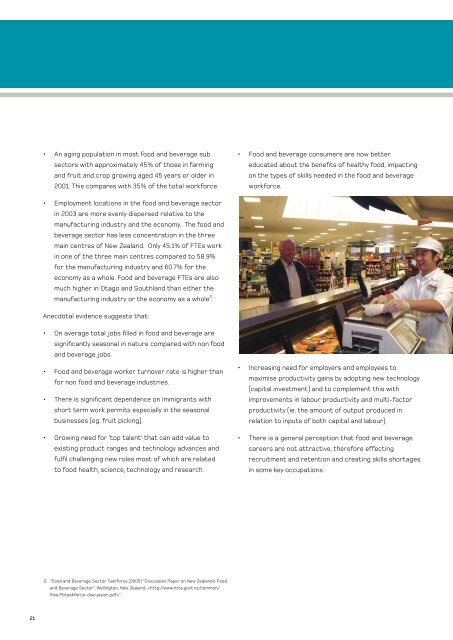
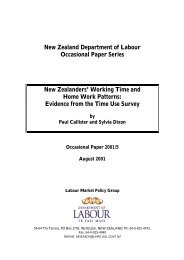
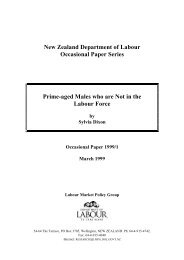
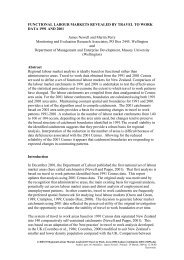
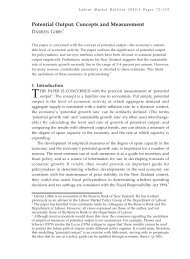

![a note on levels, trends, and some implications [pdf 21 pages, 139KB]](https://img.yumpu.com/27285836/1/184x260/a-note-on-levels-trends-and-some-implications-pdf-21-pages-139kb.jpg?quality=85)
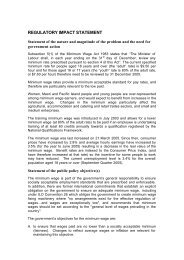

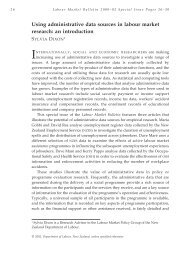
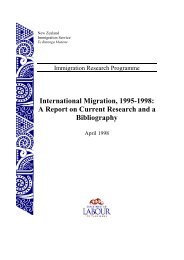

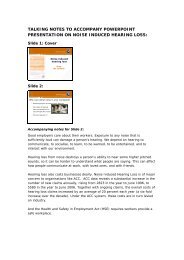
![Labour Market Trends and Outlook - 1996 [pdf 18 pages, 94KB]](https://img.yumpu.com/27285764/1/184x260/labour-market-trends-and-outlook-1996-pdf-18-pages-94kb.jpg?quality=85)

